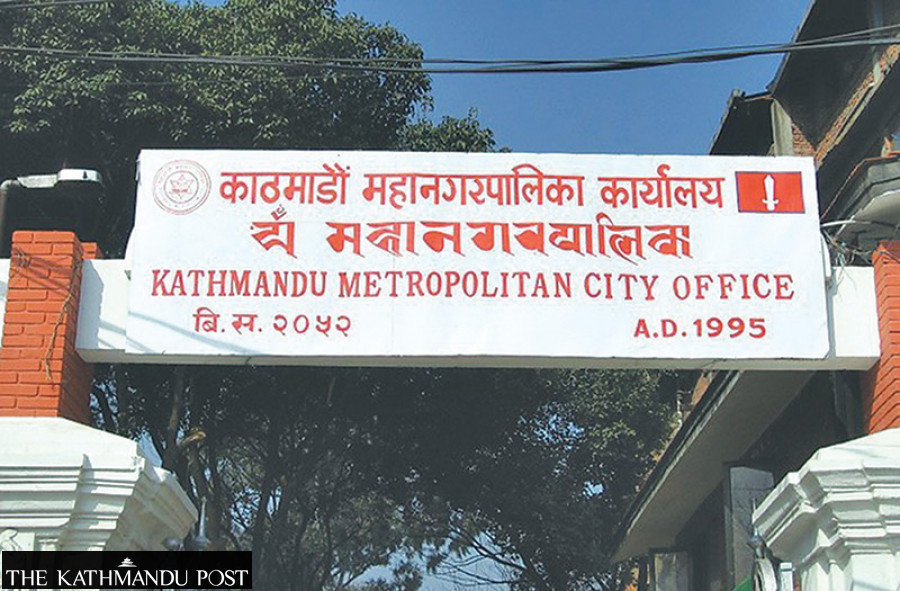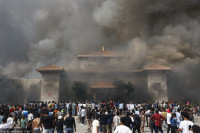Kathmandu
Rule requiring interest groups to seek approval to enter schools welcomed
The Kathmandu Metropolis introduced the rule amid complaints by many schools of unwanted interference.
Anup Ojha
At a time when one step after another by the Kathmandu Metropolitan City (KMC) has either drawn flak or failed to get support from stakeholders, one of the latest decisions by the City is being appreciated by the education sector.
As scores of community schools in the capital city had become victims of infringements by various political, religious, and other interest groups, the KMC has now made it mandatory for any group or individual wanting to conduct any activity inside a school to seek permission in advance from the City’s education department.
The schools hope the City’s decision may give them a relief from such unwanted activities. But some experts are skeptical.
The Education Department of the City on January 3 published a notice stating that before entering the premises of educational institutions, representatives of any political party, human rights group, NGOs or INGOs, religious and organisational institutions must take permission from the education department of the KMC.
Many schools had complained of unwanted interference in schools by people from political parties and other groups. Officials from various community schools the Post talked to, said such people enter the school forcefully, want to take classes, and ask students, often forcefully, to attend their political rallies, and even demand money for their political programmes.
“The KMC’s notice has given a relief and we are optimistic,” said Shiva Raj Adhikari, principal of the Sanskrit School at Durbar High School, Rani Pokhari.
“We were tired of the various groups from political parties, NGOs, or other organisations asking for our space, and telling us to allow our students to take part in their political rallies,” said Adhikari. The Durbar High School has a total of 1,100 students. He said they were fed up with political parties’ sister organisations coming to the school and asking for money as an advertiser to run their publications/magazines.
“Just before the November 20 election, representatives from many political parties came without any prior notice and disturbed our regular classes,” said Adhikari.
Another victim, the Tripureshwar-based Vishwa Niketan School too has welcomed the City’s decision on banning entry to any vested interest groups on the school’s premises.
“Despite schools being zones of peace, there have been interventions from different vested groups for years. Now, with this notice, we are very hopeful of getting rid of them,” said Heramba Raj Kadel, principal of the Vishwa Niketan School.
He shared his bitter experiences of political parties, groups or activists entering their school, forcefully asking for permission to take a class, just for five to ten minutes, but later giving misleading talks to students, for hours.
“Whenever we didn’t give them space or follow their instructions, they would threaten us with political backing, but the KMC’s decision has given us a little hope,” Kadel said. “Now, whenever such groups come, we will tell them to first take the permission from the KMC’s education department.”
According to the Education Department of the KMC, there are 89 community schools with 52,000 students in the metropolitan city.
“Over 50 percent of schools have complained to us regarding such unwanted groups coming and interfering in the education process,” said Ram Prasad Subedi, the chief of the Education Department.
He said after the Department published the notice, some politically-affiliated groups have come to his office and asked him to change the decision. “But we are committed to our decision. Even my department has sent a letter to the mayor’s secretariat and mayor Balendra Shah has appreciated the department for the decision and encouraged us to implement it,” said Subedi.
He also shared some anecdotes with the Post about how the principal of the Dillibazar-based Vijaya Memorial Secondary School was harassed for not letting his students to join a protest last year against the Millennium Challenge Corporation (MCC) and for not giving a donation.
“A politically-affiliated group had even smeared the principal with black soot for not fulfilling their demands,” said Subedi. He said there numerous bad experiences of several community school heads facing harassment from the interest groups when they didn’t fulfil their demands.
Subedi further said the Education Department is going to create a separate page on the KMC’s website through which one can float a valid proposal through the digital platform for reaching out to a particular school. “If the proposal is found related to education or awareness purposes for students, we will give permission, otherwise we won’t,” said Subedi.
Earlier in August, the KMC had directed employees, teachers, and professors to renounce political affiliations and had warned them of legal action if they did not abide by the rule.
The announcement of the KMC has been welcomed by educationists and the Nepal Guardian Federation, as well.
“Any political party or vested interest groups entering any educational institution and disrupting or disturbing their classes is against the basic rights of students,” said Suprabhat Bhandari, the president of Federation.
“Not only the KMC, all 753 local units across the country should do this, and the education sector should be kept away from intervention by political or any other interest groups,” said Bhandari.
Medin Lamichhane, an education expert, welcomed the City’s move but also pointed out a downside of such a move as well. He stressed that community schools should have strong stands on their own instead of depending on the metropolitan office. “The school’s authority should say that their students can’t be taken anywhere without their parents’ consent,” said Lamichhane.
He argued that depending on the KMC’s support may be counter productive as the intent of KMC officials may not be right all the time. “What if the KMC keeps giving approvals to certain interest groups, acting under their pressure, to enter a particular school? So, there should be a strong ground to champion that the schools and their students should be free of any kind of interference,” said Lamichhane.
Lamichhane further said it’s up to the school to decide whether or not to invite any representatives from any organisations or NGO or INGO for educational purposes. “For example, a school can invite the traffic police to run awareness classes on road safety, or other organisations to run awareness programmes on sexual violence etc,” he added.




 17.12°C Kathmandu
17.12°C Kathmandu.jpg)










